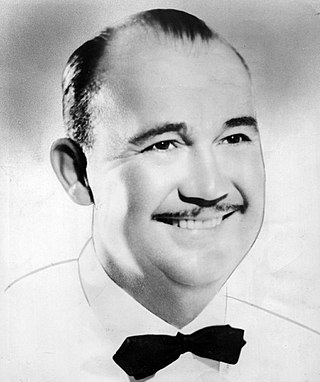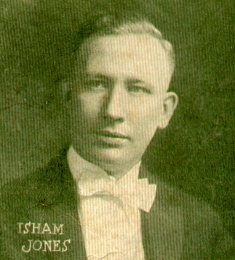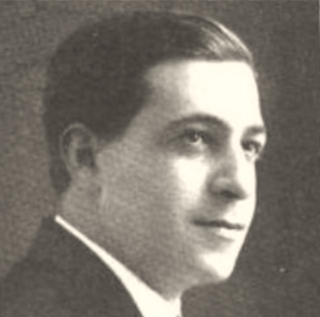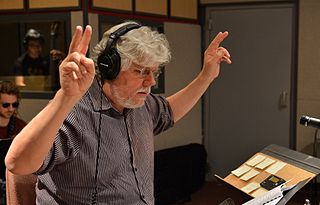Related Research Articles

Paul Samuel Whiteman was an American bandleader, composer, orchestral director, and violinist.

Sweet and Lowdown is a 1999 American comedy-drama mockumentary written and directed by Woody Allen. Loosely based on Federico Fellini's film La Strada, the film tells the story of jazz guitarist Emmet Ray who falls in love with mute laundress Hattie. Like several of Allen's other films, the film is occasionally interrupted by interviews with critics and biographers like Allen, Nat Hentoff, Daniel Okrent, and Douglas McGrath, who comment on the film's plot as if the characters were real-life people.

Isham Edgar Jones was an American bandleader, saxophonist, bassist and songwriter.

John Frederick Coots was an American songwriter. He composed over 700 popular songs and over a dozen Broadway shows. In 1934, Coots wrote the melody with his then chief collaborator, lyricist Haven Gillespie, for the biggest hit of either man's career, "Santa Claus Is Comin' to Town." The song became one of the biggest sellers in American history.

Herschel "Tex" Evans was an American tenor saxophonist who was a member of the Count Basie Orchestra. He also worked with Lionel Hampton and Buck Clayton. He is also known for starting his cousin Joe McQueen's interest in the saxophone. Joe McQueen, living until 2019 at age 100, may well have been the last surviving person to have known Herschel during his lifetime.

"I Ain't Got Nobody" is a popular song copyrighted in 1915. It was first recorded by Marion Harris, and became a perennial standard, recorded many times over the following generations, in styles ranging from pop to jazz to country music. The 2008 film Be Kind Rewind uses the version recorded by Booker T. & the M.G.'s, although two covers were recorded for the film as well: a piano solo version by Jean-Michel Bernard, and a Fats Waller-esque version by Mos Def.

"Whispering" is a popular song published in 1920 by Sherman, Clay & Co. of San Francisco. The 1920 copyright attributes the lyrics to Malvin Schonberger and the music to John Schonberger.
"There'll Be Some Changes Made" ("Changes") is a popular song by Benton Overstreet (composer) and Billy Higgins (lyricist). Published in 1921, the song has flourished in several genres, particularly jazz. The song has endured for as many years as a jazz standard. According to the online The Jazz Discography, "Changes" had been recorded 404 times as of May 2018. The song and its record debut were revolutionary, in that the songwriters (Overstreet and Higgins, the original copyright publisher, Harry Herbert Pace, the vocalist to first record it, the owners of Black Swan, the opera singer for whom the label was named, and the musicians on the recording led by Fletcher Henderson, were all African American. The production is identified by historians as a notable part of the Harlem Renaissance.
Raymond Harry "Ray" Brown is an American composer, arranger, trumpet player, and jazz educator. He has performed as trumpet player and arranged music for Stan Kenton, Bill Watrous, Bill Berry, Frank Capp – Nat Pierce, and the Full Faith and Credit Big Band.

Helen is an album released by Helen Humes in 1981 on Muse MR 5233, her second for that company. The album was in the final nominations for the 24th Annual Grammy Awards in the category of “Best Jazz Vocal Performance.”
Chester Conn was an American composer of popular music and music publisher.

Al Piantadosi was an American composer of popular music during the heyday of Tin Pan Alley. He started out as a saloon and vaudeville pianist and rapidly flourished as a songwriter. For about ten years he was an independent music publisher.

There'll Be Some Changes Made is an album by pianist Jaki Byard recorded in 1972 and released on the Muse label.
Harry David Kerr was an American songwriter, lyricist, author, and lawyer. Kerr became active in music at age 15 (1895). The practice of law had been his prime avocation until 1920, when he decided to focus on songwriting. But he still continued to use his legal training in music. In 1922, while living in New York City, Kerr prepared the incorporation documents for the American Society of Composers, Authors and Publishers (ASCAP), of which he had become one of 90 charter members at its founding in 1914.

Harry Baisden was an American composer of popular music, arranger, pianist and an acclaimed dance orchestra leader. While a musician in the U.S. Army 2nd Infantry Band during World War I, Baisden composed several popular wartime songs, namely "Iowa, We Owe A Lot To You", "Meet Me At The Red Cross Ball", "I'll Steal You" and "Camp Cody Blues".

Steve Wiest(néJohn Stephen Wiest; born 1957) is an American trombonist, composer, arranger, big band director, music educator at the collegiate level, jazz clinician, author, and illustrator/cartoonist. From 1981 to 1985, he was a featured trombonist and arranger with the Maynard Ferguson Band. Wiest is in his tenth year as Associate Professor of Jazz Studies and Commercial Music at the University of Denver Lamont School of Music. He is the Coordinator of the 21st Century Music Initiative at the school. Wiest has been a professor for thirty-five of the forty-four years that he has been a professional trombonist, composer, and arranger. From 2007 to 2014, Wiest was Associate Professor of Music in Jazz Studies at the University of North Texas College of Music and, from March 2009 to August 2014, he was director of the One O'Clock Lab Band and coordinator of the Lab Band program. At North Texas, Wiest also taught conducting, trombone, and oversaw The U-Tubes — the College of Music's jazz trombone band. Wiest is a three-time Grammy nominee — individually in 2008 for Best instrumental Arrangement and in 2010 for Best Instrumental Composition, and collaboratively in 2010 for Best Large Jazz Ensemble Album, which he directed. As of 2013, Wiest has in excess of 58 arrangements and compositions to his credit, which include 10 original compositions from his current project (see 2013–2014 project below).
Roger A. Graham was an American lyricist, composer, singer, and music publisher who flourished from 1906 to 1920 — a period that included World War I, the golden age of Tin Pan Alley, the dawn of the Jazz Age (circa 1914), and the silent film era. Graham was a proponent of vaudeville and burlesque songs. But as a lyricist and publisher, Graham is most remembered for having been an exponent of blues songs.
Wallie Herzer(néWalter Henry Herzer; 15 April 1885 San Francisco – 15 October 1961 Redwood City, California) was an American composer of popular music, music publisher, and pianist. Herzer flourished in music prior to and during World War I.
Chocolate Williams was an American jazz bassist and vocalist based in New York City. He was a prolific performer of jazz, and, notably, performed and recorded with Art Tatum in 1941 and Herbie Nichols in 1952.
William Benton Overstreet was an American songwriter, bandleader and pianist in the early twentieth century.
References
- Notes
- ↑ The C. & V. Amusement Co. was a corporation through which the Coleman Brothers, with their associates, leased and managed the Lafayette Theatre in Harlem. The Coleman Brothers took over the Lafayette around 1921 and dropped the more serious dramatic acts in favor of musical stage shows. The Lafayette was later taken over by Frank Schiffman, who, working with his sons, continued the musical stage show format.
- ↑ Edward B. Marks is currently owned by Carlin America.
- ↑ David Townsend Ringle (1894–1965).
- Catalog of Copyright Entries, Part 3 Musical Compositions, New Series, Library of Congress, Copyright Office
- Original copyrights
- Catalog of Copyright Entries, Third Series, Renewal Registrations-Music, Library of Congress, Copyright Office
- Copyright renewals
- Inline citations
- 1 2 3 4 5 6 7 Franklin, Benjamin V. (born 1939), An Encyclopedia of South Carolina Jazz and Blues Musicians, University of South Carolina Press, (2016) OCLC 927379753 "Billy Higgins," pps. 315–316
- 1 2 3 Peterson, Bernard L., Profiles of African American Stage Performers and Theatre People, 1816-1960, Greenwood Publishing Group (2001), pg. 120; OCLC 42980223 "Billy Higgins," pg. 120
- ↑ Hughes, Langston & Meltzer, Milton, Black Magic: A Pictorial History of the Negro in American Entertainment, Prentice Hall (1967); OCLC 331080 "Golden Dozen: Comics," pg. 336
- ↑ Bare, Bob (Victoria, Australia) & LeBlanc, Eric. S. (Victoria, British Columbia), Blues: A Regional Experience, Praeger Publications (2013); OCLC 861199661 "South Carolina – Billy Higgins", pg. 521
- 1 2 Sampson, Henry Thomas Jr., PhD (1934–2015), Blacks in Blackface; A Source Book On Early Black Musical Shows, Scarecrow Press (1980); OCLC 6278214
- 1 2 Cullen, Frank (né Bernard Francis Cullen; born 1936) (Boston), Vaudeville, Old & New: An Encyclopedia of Variety Performances in America, (Vol. 1 of 2), Psychology Press (2007); OCLC 62430748 "Billy Higgins," pg. 510
- ↑ "Commendation of the Regiment" (commendation letter), from Col. C.B. Humphrey, Commanding Officer 105th Pioneer Infantry, to the Adjutant General (Peter Charles Harris), G.H.Q., AEF, January 16, 1919
- 1 2 Bliss, Paul Southworth (1889–1940), Victory: History of the 805th Pioneer Infantry, American Expeditionary Forces, Saint Paul, Minnesota: published by the author (1919); OCLC 47888345, 8933282 "Presenting Billing Higgins," pps. 203–204
- ↑ U.S. National Cemetery Interment Control Forms, 1928-1962 (retrieved December 9, 2016, via www
.ancestry ) (2012).com Original record: Interment Control Forms, 1928–1962. Interment Control Forms, A1 2110-B. Records of the Office of the Quartermaster General, 1774–1985, Record Group 92. The National Archives, College Park, Maryland - ↑ "The Recordings of Josie Miles: An Annotated Tentative Personnelo - Discography" (author/editor unknown), The Harlem Fuss (retrieved November 23, 2016, via www
.harlem-fuss , maintained by Karl Bernhard "KB" Rau (born 1944), Erlangen, Germany).com - ↑ "Blues Lyrics: Josie Miles," Blues Lyrics Online, by Vital Debroey (Belgium) (retrieved 16 November 2016)
- ↑ Josie Miles: Complete Recorded Works in Chronological Order, Document Records (1996); OCLC 37622360 Vol. 1 (DOCD-5466): August 1922 to September 1924
Vol. 2 (DOCD-5467): October 1924 to March 1925 - ↑ "Pretty Valada Snow Tells of Hopes and Ambitions," Pittsburgh Courier, March 29, 1924, pg. 15, col. 4
- ↑ "Billy Higgins Succumbs – Noted Comedian, In Poor Health For 2 Years, Passes Away" (obituary), New York Age , Vol. 51, No. 34, April 27, 1937, pg. 1, col. 7
- ↑ Jerry Vogel Music Co., Inc., Plaintiff-appellant, v. Edward B. Marks Music Corporation, Defendant-appellee, 425 F.2d 834 (2d Cir. 1969)
- ↑ Laird, Ross (compiler), Moanin' Low: A Discography of Female Popular Vocal Recordings, 1920–1933; Greenwood Press (1996); OCLC 646883437 "Alberta Perkins," pg. 419
- ↑ "The Moving Picture World". 1915.
- ↑ "BMI Repertoire Song Search: ' There'll Be Some Changes Made' " (retrieved November 22, 2016)
- ↑ "Higgins, Billy" (reference entry; the "other" Billy Higgins), Oxford Index: American National Biography Online (retrieved November 22, 2016)
- Links to sheet music (public domain; copyrights expired)
- ↑ "Bull Frog Hop" (© 1918)
Perry Bradford (w&m)
© 14 February 1918 E417368
© renewal 10 February 1946 - ↑ "You'll Old Find Dixieland In France" (© 1919)
(manuscript)
George W. Meyer (music)
Grant Clarke (words)
New York: Leo Feist, Inc.
© 2 May 1919 E448838
LCCN 2013-569537 (manuscript) - ↑ "There's a Lump of Sugar Down in Dixie" (1918)
Alfred Bryan (words)
Jack Yellen (words)
Albert Gumble (1883–1946) (music)
William Austin Starmer (sheet music cover artist)
Detroit: J.H. Remick & Co.
© 6 March 1918 E418723
OCLC 19956559 - ↑ "Somebody's Done Me Wrong" (© 1816)
(coon song)
Marshall Walker (words) (1887–1940)
Will E. Skidmore (1882–1959) (music)
Kansas City: Skidmore Music Co.
© 26 December 1916 E393492
© renewed 24 July 1944 R132701
OCLC 7969269